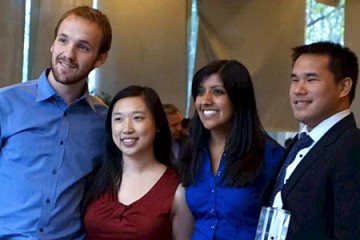Some 70 doctors, researchers, and other health professionals gathered last month for the second in the four-part Johns Hopkins University Entrepreneurship Bootcamp series.
Presented jointly by the university's Whiting School of Engineering, Carey Business School, and School of Medicine, the series is designed to foster entrepreneurship across the university, introduce researchers and clinicians to business methods, and help subject-matter experts see their own work in different ways.
Nearly half of those who signed up for the four full-day courses (which began July 16 and conclude later this month) are graduate students in some form of biomedical research or practice, and approximately two dozen participants are faculty members. Others taking part include postdoctoral fellows, residents, and staff. Topics covered include reimbursement strategy, business model development, sources of funding, intellectual property, and management of core personnel, among other topics.
Shalini Chandra, an assistant professor at the School Medicine, said the bootcamp is "an amazing experience" for her and colleague Suchitra Paranji. The two doctors are co-founders of the startup Pureffic.
Phillip Phan, a professor and executive vice dean of the Carey Business School and one of the event's co-organizers, said the Entrepreneurship Bootcamp was designed to help inventors accelerate their ideas from concept to first design, with the goal of commercialization in a startup.
"This year, we are conducting a pilot for the medical campus to prove the curriculum and pedagogy," Phan says. "If successful, next year we will be rolling it out across Hopkins as a summer start-up academy."
Phan adds that Daniels, Provost Robert Lieberman, and several Johns Hopkins deans have been very supportive, and that the interest generated by the event has been equally encouraging and widespread.
Lawrence Aronhime, senior lecturer and director of the Entrepreneurship & Management program at the JHU Center for Leadership Education, is among the event's organizers. He says the Entrepreneurship Bootcamp shows the changing culture at Hopkins.
"For those of us who have been around 15, 20 years, it shows a change in the entrepreneurial climate," Aronhime says.
Aronhime is also an organizer of the Johns Hopkins Business Plan Competition, which marked its 14th year in April by opening the medical technology arena to non-Hopkins teams. This decision was based on the continued improvement in the quality of entrepreneurial activity at Johns Hopkins.
"Now, invariably, the ideas are thoughtful and are focused on real problems, and the Hopkins teams can compete nationally and even internationally," Aronhime says. "That's testimony to the changes at Hopkins over the years."
On Aug. 14, participants will get lessons on reimbursement strategy, based on faculty experience, and primers on business model development and venture capitalization. The final installment in the series, on Aug. 29, will feature talent attraction and management strategies for startup businesses, as well as presentations and a poster session for participants to showcase their work.
For more information on the JHU Entrepreneurship Bootcamp, visit http://www.jhubootcamp.com/.
Posted in Science+Technology, University News
Tagged center for leadership education, business, entrepreneurship








